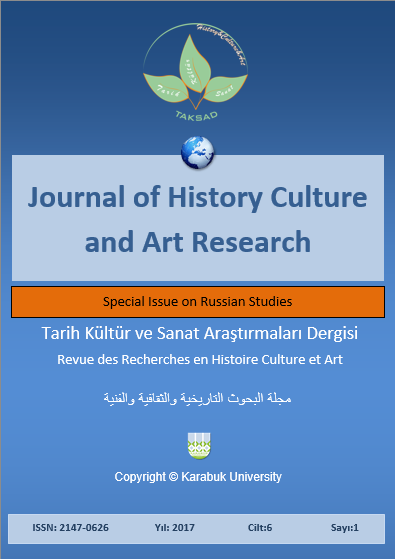Stating Values through Denial of Substance: Implementation of One Cognitive Mechanism in the Russian Substandard
DOI:
https://doi.org/10.7596/taksad.v6i5.1281Anahtar Kelimeler:
Russian language- Substandard- Semantics- Word formation- Cognitive mechanism- Value- Language picture of the world.Özet
The article is devoted to the study of objectification in the substandard forms of Russian language concerning the conceptual norm of possession, which represents the axiological aspect of the world picture by sociolect holders. The relevance of the work is determined by the belonging of the indicated problem to the field of the interest intersection from the theory of nomination, cognitive linguistics and social linguistics, and at the same time, by an insufficient knowledge of the implementation means in the mechanism language of value marking concerning socially separate groups of Russian mentality bearers. In Russian language, the cognitive mechanism of value assertion through the negation of a substance is realized through the word-formation category "an attribute for the lack of substance", which belongs to the number of productive nominative categories. Our task was a complex structural and functional description of sub-standard derivatives of this category with the aim to their further comprehension from onomasiologic and cognitive positions. This conditioned the use of word-formation and component analysis methods. Basing on the works by E.S. Kubryakova and N.D. Arutunova, we determined the essence of the Russian mental norm of possession. The model of field organization proposed by us concerning the mental norm of possession made it possible to draw the conclusion about the complexity of the value basis organization concerning the Russian national worldview, determining the role in which the spiritual and moral guidelines play an important role, and the material values located on the periphery are less significant. The results of the research can be applied in the field of linguistic didactics, especially in the practice of teaching Russian as a foreign language, as well as in the organization of associative and social linguistic experiments.
Referanslar
Abrosimova, L. S. (2015). Word formation in the language categorization of the world. Rostov: Publishing House of the South Federal University.
Arutyunova, N. D. (1988). Types of language values: Evaluation, event, fact. Moscow: Nauka.
Dictionary of new vocabulary (2017). Jargon and slang of Russian language. URL: http://www.slovonovo.ru/ (08.04.2017).
Elistratov, V. S. (2000). Dictionary of Russian Argo: Materials of 1980-90s. Moscow: Russian words.
Galeev, T. I. (2016). The lexeme Samodyerzhets 'autocrat' and its morphological derivatives in Russian. Journal of Language and Literature, 7(2), 383-388.
Habibulina, E. (2015). Substandard derivations as objects of system analysis: derivational homonyms. XLinguae, 8(1), 50-56.
Kosova, V. A. (2014). Formative categories of Russian language: problems of theory. Kazan: New knowledge.
Kubryakova, E. S. (2009a). In search of language essence. The issues of cognitive linguistics, 1, 5-12.
Kubryakova, E. S. (2009b). On the cognitive foundations of word formation. Actual problems of modern word formation: collection of art (pp. 15-19). Kemerovo: Publishing house of Kemerovo State University.
Makleeva, E. A. & Kosova, V. A. (2016). Sun Miao. Jargon compressive nominations from the point of view of the Russian linguistic world-image. Journal of Language and Literature, 7(1), 199-202.
Miftakhova, A. N.; Makleeva, E. A. & Rakhimova, A. R. (2016). Means of evaluativity expressing in the work of A.I. Solzhenitsyn One day in the life of Ivan Denisovich. Journal of Language and Literature, 7(3), 159-162.
Mokienko, V. M. & Nikitina, T. G. (2000). Grand dictionary of Russian jargon. St. Petersburg: Norint.
Nikitina, T. G. (2003). Dictionary of youth slang: 1980-2000. St. Petersburg: Norint.
Ukhanova, T. V. & Kosova, V. A. (2016a). Adjectives with confixes as markers of social significance of a reality. Philology and culture, 1(43), 121-126.
Ukhanova, T. V. & Kosova, V. A. (2016b). Russian adjectives with confixes from an anthropocentric viewpoint. Journal of Language and Literature, 7(2), 328-331.
İndir
Yayınlanmış
Nasıl Atıf Yapılır
Sayı
Bölüm
Lisans
Tarih Kültür ve Sanat Araştırmaları Dergisi'nde yayımlanan tüm çalışmalar Creative Commons 4.0 CC-BY lisansı ile lisanslanmıştır.
Bunları yapmakta özgürsünüz:
- Bu eseri her boyut ve formatta paylaşabilir — kopyalayabilir ve çoğaltabilirsiniz.
- Materyalden Adapte et — karıştır, aktar ve eserin üzerine inşa et
- her türlü amaç için, ticari amaç da dahil
Alttaki şartlar altında:
Atıf — uygun bilgiyi, lisansa linki, and ve değişiklik yapıldıysa değişiklik bilgisinivermelisiniz. Sizi veya kullanımınızı lisansörün onayladığı bilgisini içermemek kaydıyla, size uygun şekilde bu işlemleri gerçekleştirebilirsiniz.
AynıLisanslaPaylaş — Eğer materyali karıştırdınızsa, aktardınızsa ya da materyalin üzerine çalıştınızsa, ancak aynı lisans ile dağıtabilirsiniz.
- Ek sınırlamalar yoktur — Lisansın izin verdiği hakları başkaları üzerinde kanunlarla ya da teknolojiyikullanarak sınırlayamazsınız.







